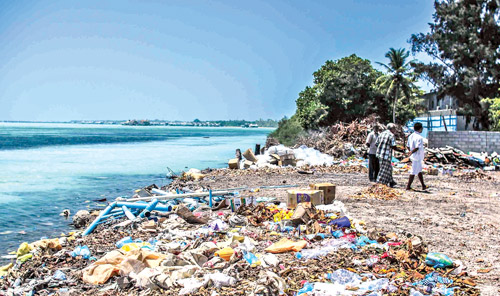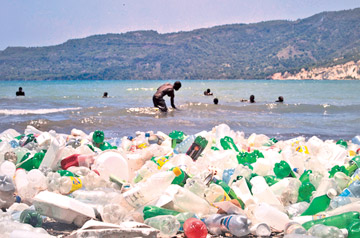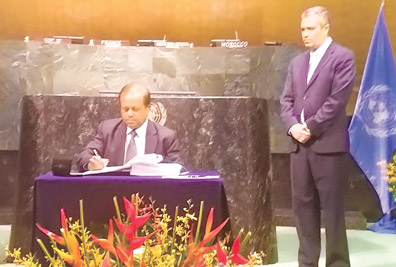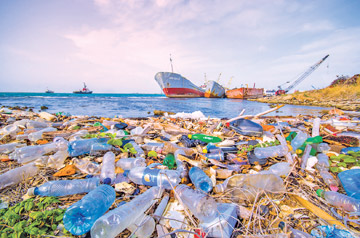 LIVING IN A WORLD OF PLASTIC LIVING IN A WORLD OF PLASTIC
by Dhaneshi Yatawara
Sri Lanka doesn't top a great number of world rankings but in 2010,
according to a report published by the International Business Times, Sri
Lanka sat near the top of the world in terms of how much plastic the
island dumped into the ocean.
In 2010, it was estimated that Sri Lanka dumped 1.59 metric tons of
plastic into its surrounding Indian Ocean, making us the 5th largest
plastic-marine polluter in the world.
Only Vietnam (1.83 Mt/year), Philippines (1.88 Mt/year), Indonesia
(3.22 Mt/year) and China (8.82 Mt/year) managed to pollute the sea more
than we did, and of course they all have far larger populations than
this little island making us arguably the leading plastic polluter per
capita in the world.
Today five years after the publication of the IBT Report, local
experts claimed the amount of Sri Lankan trash reaching the ocean has
decreased.
"Most of the trash is generated in inland areas not in the coastal
areas," said General Manager of the Marine Environment Protection
Authority, Dr. Terney Pradeep Kumara.
"According to research to evaluate global levels, trash amounts seems
to be decreasing, but the true nature of the decrease is yet to be
identified," he said.
 According to Dr. Pradeep Kumara, apart from inland trash ending up in
our seas, the ocean currents around the country carry trash from
countries such as India, Bangladesh and some East Asian countries -
which is beyond the control of the authorities. According to Dr. Pradeep Kumara, apart from inland trash ending up in
our seas, the ocean currents around the country carry trash from
countries such as India, Bangladesh and some East Asian countries -
which is beyond the control of the authorities.
"Being in the centre of a large number of shipping lanes, Sri Lankan
waters are affected by trash dumped by the ships as well," said Dr.
Kumara.
Aquatic creatures
However, whether the origin of the trash is domestic or foreign,
inland or coastal, it's undeniable that Sri Lanka, its oceans, beaches
and inland waterways accommodate an excess of plastic. Which leaves
experts asking the question- what can we do to protect our marine bio
diversity?
The accumulation of plastics is toxic to a range of habitats and
marine life. Fish and other aquatic creatures find themselves trapped in
discarded plastic, pots, rags and nets.
Environmentalists and scientists strongly believe, the only solution
is to cut back on plastic waste generation and develop effective
waste-management solutions for our ever-growing piles of rubbish.
Combatting climate change
Sri Lanka signs Paris Agreement:
|

Minister Susil Premajayantha endorsing the Paris
Agreement |
Sri Lanka was among the 171 countries that signed the Paris Agreement
on April 22 at the High- Level Signature Ceremony of the Paris Agreement
at the United Nations Headquarters in New York. The ceremony is the
culmination of negotiations held amongst UN Member States who agreed on
the landmark climate deal during the 21st Conference of Parties (COP21)
held in Paris in December 2015.
Minister of Science, Technology and Research, Susil Premajayantha
signed the Agreement on behalf of Sri Lanka. The signature ceremony is a
precursor to the ratification of the Agreement by each individual state,
the most important step in ensuring the Paris Agreement is implemented
globally.
The Paris Agreement hopes to achieve, among many goals, the
prevention of an increase in global temperature of more than 2 degrees
Celsius (3.6 degrees Fahrenheit), requiring countries to set their own
national targets beginning in 2020, and mandatory reporting, including
non-binding transparency in implementing the Agreement.
Minister Premajayantha delivered a national statement which
highlighted the historical value the people of Sri Lanka had placed on
the preservation of nature and the climate. |
Any layman at a supermarket can see how many plastic bags are used.
If you check out five items you will have around seven plastic bags. The
convenience of plastic bags replaced older eco-friendly methods used by
grocery stores of old. Paper and cloth bags are still rarely seen,
despite limited promotional efforts by supermarkets.
It's not just bags, glass bottles have been replaced by plastic, in
fact large soft drink manufacturers in the island continue to replace
glass vessels with plastic. Sri Lanka seems to be following market
practices discarded decades ago elsewhere.
Compounding the problem of our excessive use of plastic, is the fact
that there are limited avenues for the proper disposal of plastics in
the country. Swamps, lagoons and estuaries are still commonly used as
garbage dumping sites and what is dumped in a river or lagoon will
eventually end up in the sea.
Aggravating the issue is the proliferation of 'micro plastic' which
is hidden inside many items we use daily such as toothpaste and creams.
Sea's dwellers
Despite the rising tide of waste, the government's environment policy
plans for a waste free country in three years, will come acropper.
 However, there's no real hope of eliminating Sri Lanka's marine waste
problem in such a short timeframe. And the reality is, this is not just
a local problem, trash from around the world deposits itself on our
beaches. Plastic and other rubbish has been found in the deep ocean and
buried even in the Arctic ice. However, there's no real hope of eliminating Sri Lanka's marine waste
problem in such a short timeframe. And the reality is, this is not just
a local problem, trash from around the world deposits itself on our
beaches. Plastic and other rubbish has been found in the deep ocean and
buried even in the Arctic ice.
From the smallest plankton and krill ensnared in scraps of plastic to
mighty Baleens whales who take in plastic as they suck in tons of sea
water none of the sea's dwellers are immune from its effect.
Yet, the world just keeps producing more plastic waste. According to
the University of Georgia the amount of trash ending up in the oceans is
set to double by 2025. This means in nine years there will be nearly 155
million metric tons of plastic waste- equal to 10 bags full of plastic
for every foot of the world's coastline.
The only way we can stave off this is, if drastic measures are taken
at an individual, national and international level. But no matter what
is done by world bodies and government institutions without change from
individual consumers, producers and polluters who are at the heart of
the problem, the oceans will continue to choke.
The power to stop the plastic rot therefore - is yours.
|

